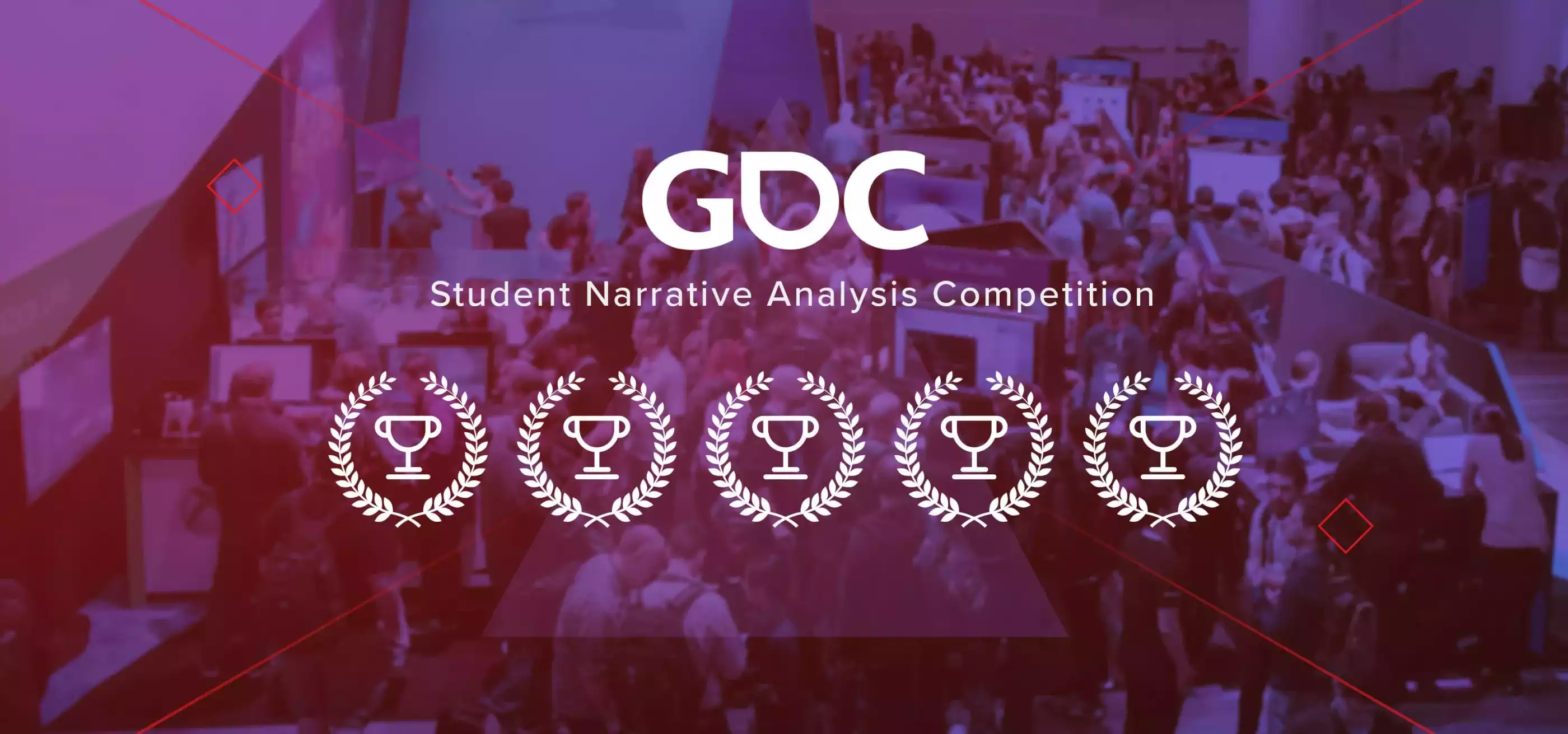DigiPen game design lecturer Angie Forster decided to try an experiment in her class this year. “I’m teaching students to create games, so I like to build things into my courses that give them some game-like aspects, like choosing which final they want to do,” Forster says.
In DES 230, Forster’s introductory narrative design course, one new finals option was to enter the Game Developers Conference (GDC) Student Narrative Analysis Competition. The annual contest, put on by the conference’s Game Narrative Summit advisory board, evaluates students on a detailed, structural analysis of the narrative elements from a game of their choice. “I was actually inspired by [Humanities and Social Sciences Department Chair] Sonia Michaels, who has been running this competition for us for years now,” Forster says. The new finals experiment turned out to be a wild success. Five DES 230 students found emails in their inboxes at the end of January informing them that their finals had won GDC Gold. “When I found out, I flat out cried,” Forster says. “I’m so dang proud of them!”
Students got plenty of practice in narrative analysis before starting on their award-winning submissions. Throughout the semester, DES 230 students played one chapter each week from the story-driven 2018 sci-fi game, Detroit: Become Human. “We framed narrative design concepts like the golden path, breadcrumbing, quest writing, and dialogue through the game,” Forster says. “The lab was a big writers room where we would all do narrative analysis of the game chapters, practicing this skill every single week.”
As narrative designers, we’re not just writing a story that the player passively experiences. The world-building and characterization must be ingrained in the gameplay itself.
Students used that knowledge to approach their GDC competition analyses in unique ways. “The old adage of ‘show, don’t tell’ doesn’t correctly capture how storytelling should be handled in games,” says gold winner Joseph Knezek. “Games are an inherently interactive medium, so ‘show, don’t tell’ evolves into ‘do, don’t show.’” Knezek chose to stretch that concept to its limits by analyzing Kenshi, a 2018 indie role-playing game that utilizes very few traditional storytelling methods, relying almost entirely on ambient world-building and gameplay instead. “I decided to analyze this almost purely mechanical game to explore using gameplay to convey narrative in more detail, and to offer a contrasting example to conventional narrative games,” Knezek says.
Fellow gold winner Keion Rodriguez decided to investigate the interactive character development in Marvel’s Spider-Man: Miles Morales. “As someone who is Afro-Latino, I’ve always felt very close to Miles,” Rodriguez says. “As narrative designers, we’re not just writing a story that the player passively experiences. The world-building and characterization must be ingrained in the gameplay itself.” Rodriguez’s analysis pulled apart the many ways Insomniac Games successfully infused its gameplay with narrative elements, highlighting the studio’s subtle, but effective choices. “Miles’ personality shines through all of his actions, major and minor,” Rodriguez says. “The way he swings, the way he fights, even the way he lands all point to and give us a clear picture of who he is. To keep the player immersed in this world, every phone call happens while you’re out on patrol, not locking you into a needless two-minute cut scene.”
Meanwhile, gold winner Mayzie Wilkinson chose to dive into a title whose faults she found as interesting as its successes — 2017’s visual novel Danganronpa V3: Killing Harmony. “When V3 first came out, I had been a fan of Danganronpa for a few years. I was entranced by this game for quite some time, though it gradually faded from my mind as I got older,” Wilkinson says. The game’s legacy sits in an interesting gray area, with many critics and fans vocally split on whether its structure, themes and narrative choices mark a high or low point in the long-running series. “I value what Danganronpa does wrong just as much as what it does right,” Wilkinson says. “A game with such a vast range of interpretations and quality is an amazing essay topic — I couldn’t pass it up!”
Forster attributes a big part of the students’ success to the support they offered one another throughout the 10- to 15-page essay-writing process. “We created a separate Microsoft Teams chat just for the contest entrants,” she says. “I was seeing them help each other so much on the chat, writing things like, ‘Hey your topic is really cool. Can I read your paper and you read mine?’ Some solid camaraderie was built that really made their submissions shine.”
Students who chose the GDC competition as their DES 230 final had to submit three weeks before the semester’s end to meet the contest deadline. Wilkinson says she hadn’t been on the internal chat for quite a while when the good news rolled in. “I looked at it by chance a few hours after the other winners had already gotten their results and frantically checked my email,” Wilkinson says, adding she was “elated” to find out she’d won. Rodriguez’s congrats email elicited some very vocal celebration. “I ‘Woo’d!’ like you wouldn’t believe,” he says. Knezek had a hard time believing the win. “It felt unreal. I honestly didn’t expect to win anything,” Knezek says. “Needless to say that I’ve been very excited ever since the winners were announced!”
There’s good reason for the students to be excited, as their gold winner status earns them free GDC passes and a chance to display their analyses on posters at the conference’s Game Narrative Summit. “GDC is one of the best places to land a job, and what better way to get noticed than going into it as a gold winner?” Forster says. “There’s been a lot of excitement about what’s next.”
In addition to the five award recipients from DigiPen’s Redmond campus, two students from DigiPen Institute of Technology Singapore also received gold winner honors.
DigiPen Institute of Technology Gold Winners
DigiPen Institute of Technology Singapore Gold Winners
